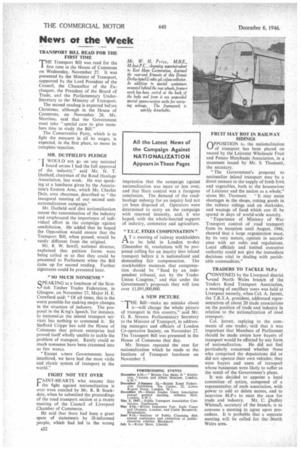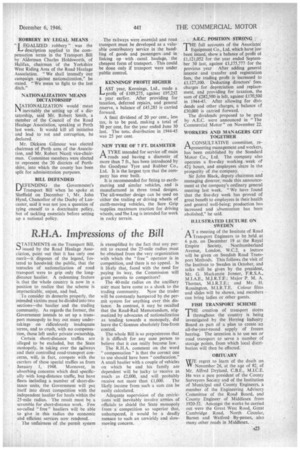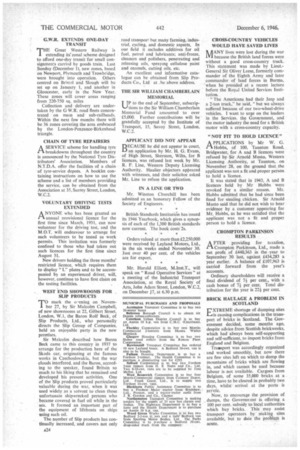News ot the Week
Page 24

Page 25

Page 26

If you've noticed an error in this article please click here to report it so we can fix it.
TRANSPORT BILL READ FOR THE FIRST TIME
THE Transport Bill was read for the first time in the House of Commons on Wednesday, November 27. It was presented by the Minister of Transport, supported by the Lord President of the Council, the Chancellor of the Exchequer, the President of the Board of Trade, and the Parliamentary UnderSecretary to the Ministry of Transport.
The second reading is expected before Christmas, although in the House of Commons, on November 28, Mr. Morrisoi, said that the Government must take "special care to give members time to study the Bill."
The Conservative Party, which is to fight the measure in all its stages, is expected, in the first place, to move its complete rejection.
MR. OUTFIELD'S PLEDGE
I WOULD not go on 'any national
board timess I had the full approval of the industry," said Mr. H. T. Outfield, chairman of the Road Haulage Association, last week. He was speaking at a luncheon given by tile Association's Eastern Area, which Mr. Charles Dale, area chairman, described as " the inaugural meeting of our second antinationalization campaign."
Mr. Dutfield said that nationalization meant the extermination of the industry and emphasized the importance of individual effort in the campaign against annihilation. He added that he hoped the Opposition would ensure that the Transport Bill, when passed, would be vastly different from the original.
Mr, R. W. Sewill, national director, explained that petition forms were being called in so that they could be presented to Parliament when the Bill came up for second reading. Further signatures could be presented later.
"SO MUCH NONSENSE" QPEAKING at a luncheon of the Seot tish Timber Trades Federation, in Glasgow. on November 27, Major H. E. Crawfurd said: "Of all times, this is the worst possible for making major changes in the structure of industry. The proposal in the Kmg's Speech, for instance, to nationalize the inland transport service§ has nothing to commend it. Sir Stafford Cripps has told the House of Commons that private enterprise had proved itself wholly unable to tackle the problem of transport. Rarely could so much nonsense have been crammed into so few worc..s.
"Except where Governments have interfered, we have had the most virile and elastic system of transport in the world."
FIGHT NOT YET OVER
rA1NT-HEARTS who assume that I the fight against nationalization is over were assailed by Mr. R. B. Stockdale, when he submitted the proceedings of the road transport section at a recent meeting of the Council of Liverpool Chamber of Commerce.
He said that there had been a great spate of statements by ill-informed people, which had led to the wrong impression that the campaign against nationalization was more or less over, and that State control was a foregone conclusion. The demand of the roadhaulage industry for an inquiry had not yet been disposed of. Operators were determined to carry on the campaign with renewed intensity, and, it was hoped, with the whole-hearted support of industry, commerce and agriculture.
" T.U.C. FIXES COMPENSATION"
AT a meeting of railway stockholders to be held in London to-day (December 6), resolutions will be proposed calling for an inquiry into inland transport before it is nationalized and demanding fair compensation. The stockholders maintain that compensation should be "fixed by an independent tribunal, not by the Trades Union Congress," and that under the Government's proposals they will lose over 11,091,000,000.
A NEW PICTURE
E Bill—make no mistake about change the whole picture of transport in this country," said Mr. G. R. Strauss Parliamentary Secretary to the Minister of Transport, in addressing managers and officials of London Co-operative Society, on November 27. The Transport Rill was presented in the House of Commons that day.
Mr. Strauss repeated the case for nationalization which he made at the Institute of Transport luncheon on November 5.
FRUIT MAY ROT IN RAILWAY SIDINGS
OPPOSITION to the nationalization of transport has been placed on record by the Leicester Wholesale Fruit and Potato Merchants Association, in 4 statement issued by Mr. S. Thomsett, the secretary.
" The Government's proposal to nationalize inland transport may be a direct menace to the supply of fresh fruit and vegetables, both to the housewives of Leicester and the nation as a whole," states Mr. Thomsett. "It may mean shortages in the shops, rotting goods in the railway sidings and on docksides, and wastage of food which can ill he spared in days of world-wide scarcity.
"Experience of Ministry of War Transport control of road transport from its inception until August, 1946, showed that a large organization must, by its very nature, operate in accordance with set rules and regulations. Local officials and limited executive authority could not give the immediate decisions vital in dealing with perishable commodities."
TRADERS TO TACKLE M.P.s CONVENED by the Liverpool district '—'and North Wales branch of the Traders Road Transport Association, a meeting of ancillary users was held at Liverpool recently, when Col. A. Jerrett, the T.R.T.A. president, addressed representatives of about 20 trade associations on the position of trade and industry in relation to the nationalization of road transport.
Col. Jerrett, replying to the comments of one trader, said that it was important that Members of Parliament should be made aware how buyers of transport would be affected by any form of nationalization. He did not feel particularly concerned whether those who comprised the deputations did or did not operate their own vehicles; they were buyers and users of transport whose businesses were likely to suffer as the result of the Government's plans.
It was decided to appoint a local committee of action, composed of a representative of each association, with power to add or delete names, and to interview M.P.s to state the case for trade and industry. Mr. C. Dudley Whitnall, secretary of the branch, is to convene a meeting to agree upon procedure. It is probable that a separate meeting will be called for the 1North Wales area, ROBBERY BY LEGAL MEANS " EGALIZED robbery" was the
1--1 description applied to the compensation terms in the Transport Bill by Alderman Charles Holdsworth, of Halifax, chairman of the Yorkshire West Riding Area of the Road Haulage Association. "We shall intensify our campaign against nationalization," he stated. "We mean to fight to the last ditch."
NATIONALIZATION 'MEANS DICTATORSHIP
MATIONALIZATION would mean 1 11 inevitably the setting up of a dictatorship, said Mr. Robert Smith, a member of the Council of the Road Haulage Association, speaking at Perth last week. It would kill all initiative and lead to rot and corruption, he declared.
Mr. Dickson Gilmour was elected chairman of Perth area of the Association, and Mr. Robert Nicoll vice-chairman. Committee members were elected to represent the 20 districts of Perthshire, into which the county has been split for administration purposes.
BILL DEFENDED BILL DEFENDED
nEFENDING the Government's
Transport Bill when he spoke at Sheffield on December 1, Mr. John Hynd, Chancellor of the Duchy of Lancaster, said it was not just a question of tying oneself to a doctrinaire policy, but of tackling essentials before setting up a national policy. The railways were essential and roaa transport must be developed as a valuable contributory service in the handling of goods and passengers and in linking up with canal haulage, the cheapest form of transport. This could be done only if transport were under public control.
KENNINGS' PROFIT HIGHER
LAST year, Kennings, Ltd., made a profit of £109,275, against £95,252 a year earlier. After providing for taxation, deferred repairs, and general reserve, a balance of £45,285 is carried forward.
A final dividend of 20 per cent., less tax, is to be paid, making a total of 30 per cent, for the year ended June 30 last. The totai distribution in 1944-45 was 25 per cent.
NEW TYRE OF 7 FT. DIAMETER
ATYRE intended for service off main roads and having a diameter of more than 7 ft., has been introduced by the Goodyear Tyre and Rubber Co., Ltd. It is the largest tyre that the company has ever built.
It is recommended for fitting to earthmoving and similar vehicles, and is manufactured in three tread designs. The ail-weather design can be used on either the trailing or driving wheels of earth-moving vehicles, the Sure Grip supplies maximum traction for driving wheels, and The Lug is intended for work in rocky terrain. A.E.C. POSITION STRONG .
THE full accounts of the Associate Equipment Co., Ltd, which have just been issued, show a balance of profit of £1,121,052 for the year ended September 30 last, against £1,175,777 for the previous year After adding general interest and transfer and registration fees, the trading profit is increased to £1,127,100. Deducting directors' fees. charges for depreciation and replacement, and providing for taxation, the sum of £282,500 is left, against £170,500 in 1944-45. After allowing for dividends and other charges, a balance of
£30,000 is carried forward. • The dividends proposed to be paid by A.E.C. were announced in "The Commercial Motor" on November 22.
WORKERS AND MANAGERS GET TOGETHER
A CONSULTATIVE committee, re
presenting management and workers, has been established by the Standard Motor Co., Ltd. The company also operates a five-day working week of 421 hours, and employees share in the prosperity of the company.
Sir John Black, deputy chairman and managing director, made this announcement at the company's ordinary general meeting last week. "We have found that the five-day week has proved of great benefit to employees in their health and general well-being; production has increased and absenteeism has been abolished," he said.
ILLUSTRATED LECTURE ON SWEDEN
AT a meeting of the Institute of Road Transport Engineers to be held at 6 p.m. on December 19 at the Royal Empire Society, Northumberland Avenue, London, W.C.2, a lecture will be given on Swedish Road Transport Methods. This follows the visit of the Institute to Sweden in October, and talks will be given by the president, Mr. G. Mackenzie Junner, F.R.S.A., M.I.A.E., M.I.R.T.E.; Major P. M. A. Thomas, M.1.R.T.E.; and Mr. H. Rossington, M.I.R.T.E. Colour films and slides will be shown, and members can bring ladies or other guests.
FISH TRANSPORT SCHEME
THE creation of transport stores throughout the country is being investigated by the Herring Industry Board as part of a plan to create an all-the-year-round supply of frozen herring. The intention is to use sea or road transport to serve a number, of storage points, from which local distribution will then be effected.
OBITUARY
WE regret to learn of the death on YY November 26, at the age of 82, of Mr, Alfred Dryland, C.B.E., M.I.C.E. He was a past president of the County Surveyors Society and of the Institution of Municipal and County Engineers, a member of the Engineering Advisory Committee of the Road Board, and County Engineer of Middlesex from 1920-32. Amongst the works he carried out were the Great West Road, Great Cambridge Road, North Circular, Barnet and Watford By-passes, also many other roads in Middlesex. ,
G.W.R. EXTENDS ONE-DAY TRANSIT
THE Great Western Railway is extending itezonal scheme designed to afford one-day transit for small consignments carried by goods tram. Last Sunday (December I), new zones, based on Newport. Plymouth and Trowbridge, were brought into operation. Others centred on Bristol and Slough will he set up on January 1, and another in Gloucester, early in the New Year. These zones will cover areas ranging from 220-750 sq. miles
Collection and delivery are undertaken by the G W.R. road fleets concentrated on main and sub-railheads. Within the next few months there will be 36 zones covering the area embraced by the London-Penzance-Birkenhead triangle_ CHAIN OF TYRE REPAIRERS
ASERVICE scheme for handling tyre breakdowns throughout the country is announced by the National Tyre Distributors' Association. Members of N.T.D.A. offer the facilities of a chain of tyre-service depots. A booklet containing instructions on how to use the scheme and a list of members providing the service, can be obtained from the Association at 35, Surrey Street, London, W.C.2.
VOLUNTARY DRIVING TESTS EXTENDED
ANYONE who has been granted an annual provisional licence for the first time since March. 1931, can now volunteer for the driving test, and the M.O.T. will endeavour to arrange for such volunteers to be tested as work permits. This invitation was formerly confined to those who had taken out such licences for the first time since August 31.
New drivers holding the three months' restricted licence. whieh requires them to display "L" plates and to be accompanied by an experienced driver, will, however, continue to have first claim on the testing facilities.
WEST END SHOWROOMS FOR SLIP PRODUCTS
TO mark the o -ening on November 27, by Sir Malcolm Campbell, of new showrooms at 22, Gilbert Street, London, W.I. the Baron Rolf Beck, of Slip Products, Ltd., who personally directs the Slip Group of Companies, held an enjoyable party in the new premises.
Sir Malcolm described how Baron Beck came to this country in 1937 to arrange for the production here of the Skoda car, originating at the famous works in Czechoslovakia. but the war clouds interfered, and the Baron, according to the speaker, found Britain so much to his liking that he remained and developed his present activities. One of the Slip products proved particularly valuable during the war, when it was used widely as a solvent to clean those unfortunate shipwrecked persons who became covered in fuel oil while in the sea. It formed an important part of the equipment of lifeboats on ships using such oil.
The number of Slip products has continually increased, and covers not only road transom t hut many farming, industrial, cycling, and domestic aspects. In our field it Includes additives for oil fuel, petrol and lubricants; anti-freeze, cleaners and polishers, penetrating and releasing oils, spraying cellulose paint and enamels, cutting oils, etc.
An excellent and informative catalogue can be obtained from Slip Products Co., Ltd at .he above address.
THE SIR WILLIAM CHAMBERLAIN MEMORIAL
UP to the end of September, subscriptions to the Sir William Chamberlain Memorial Fund amounted to over £5,000. Further contributions will be gratefully accepted by the Institute of Transport, 15, Savoy Street, London, W.C.2.
APPLICANT DID NOT APPEAR
BECAUSE he did not appear in court, an application by Mr. H. G. Evans, of High Street, Sherston, Wilts, for B licences, was refused last week by Mr. R. F. Line, Western Deputy Licensing Authority. Haulier objectors appeared with witnesses, and their solicitor asked Mr. Line to refuse the application.
IN A LINE OR TWO Mr. Winston Churchill has been admitted as an honorary Fellow of the Society of Engineers.
British Standards Institutitcri has issued its 1946 Yearbook, which gives a synopsis of each of the 1,300 British standards now current. The book costs 2s.
Orders valued at more than £2,250,000 were received by Leyland Motors, Ltd., in the six weeks ended November 30. Just over 40 per cent, of the vehicles are for export.
Mr. Harold Elliott, M.Inst.T., will speak on "Road Operative Services" at a meeting of the Industrial Transport Association, at the Royal Society of Arts, John Adam Street, London, W.C.2, on December 17, at 6.30 p.m. CROSS-COUNTRY VEHICLES WOULD HAVE SAVED LIVES 1%/TANY lives were lost during the war VI because the British land forces were without a good cross-country truck. This statement was made by Lieut.General Sir Oliver Leese, formerly commander of the Eighth Army and later commander of land forces in Burma, when he presided at a recent lecture before the Royal United Services Institution.
"The Americans had their Jeep and a 2-ton truck," he said, "but we always suffered because of our two-wheel-drive vehicles. I want to urge on the leaders in the Services, the Government, and the motor industry the need for a British motor with a cross-country capacity.
"NOT FIT TO HOLD LICENCE"
A PPL1CATIONS by Mr W. G. 1-".Hobbs, of 100, Taunton Road, Bridgwater, for A and B licences were refused by Sir Arnold Musto, Western Licensing Authority, at Taunton, on November 28, on the ground that the applicant was not a fit and proper person to hold a licence.
It was stated that in 1943, A and B licences held by Mr Hobbs were revoked for a similar reason. Mr. Hobbs admitted that he had since been fined for stealing chicken. Sir Arnold Musto said that he did not wish to hear evidence by a customer appearing for Mr. Hobbs, as he was satisfied that the applicant was not a fit and proper person to hold a licence.
CROMPTON PARKINSON RESULTS
AFTER providing for taxation. Crompton Parkinson, Ltd., made a net profit of £440,363 in the year to September 30 last, against £434,283 a year earlier. A balance of £107,963 is carried forward from the year's accounts.
Ordinary shareholders will receive a final dividend of 7* per cent., with a cash bonus of 7i per cent. Total distribution for the year is 221 per cent.
BRICK HAULAGE A PROBLEM IN SCOTLAND
EXTREME shortage of dumping sites is causing complications in the transport of bricks in Scotland. The Government decided, some months ago, despite advice from Scottish brickworks, which had always been self-supporting and self-sufficient, to import bricks from England and Belgium.
Transport was accordingly organized and worked smoothly, but now there are few sites left on which to dump the mountains of bricks which are flowing in, and which cannot be used because labour is not available. Cargoes from Belgium, of some 35.000 bricks at a time, have to be cleared in probably two days, whilst arrival at the ports is
Now, to encourage the provision of dumps, the Government is offering a 100 per cent. subsidy to local authorities which buy bricks. This may assist transport operators by making sites available, but to date the proble#a is acute.




































































